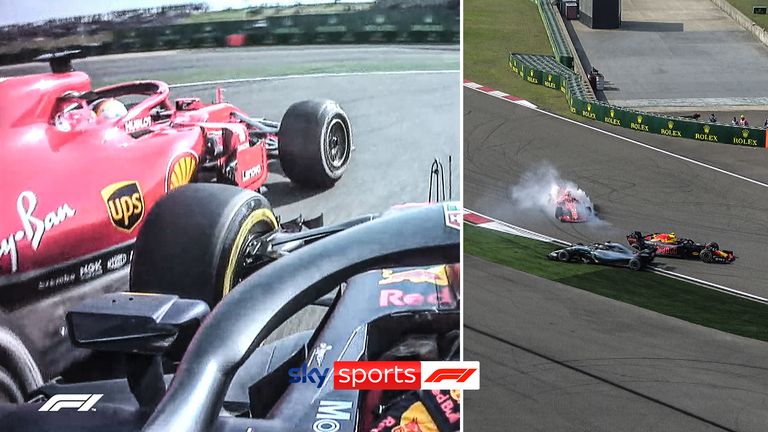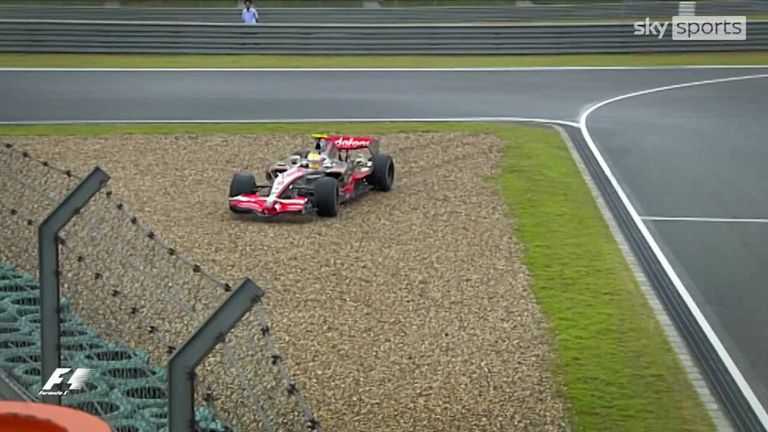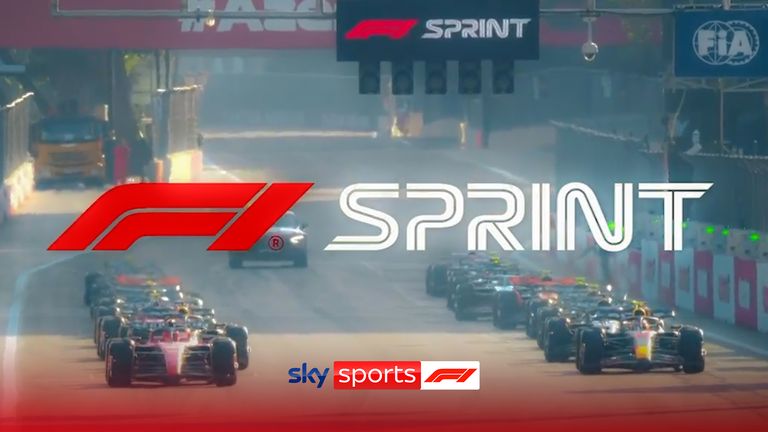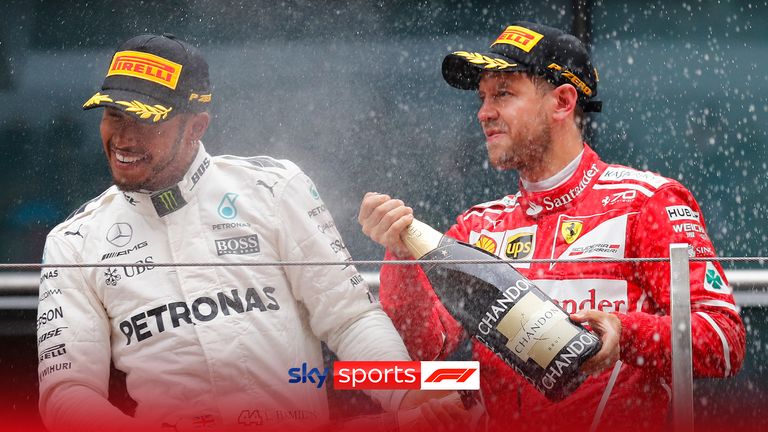Sky Sports F1’s strategy expert Bernie Collins analyses the key considerations for teams as China hosts the first Sprint weekend of the 2024 season; watch the Chinese GP live on Sky Sports F1 with Sprint Qualifying at 8.30am on Friday morning

On the F1 Podcast, Bernie Collins delved into the recent Sprint format which she believes to be the most reasonable layout
Ahead of the first Sprint weekend of the 2024 season at the Chinese Grand Prix, Sky Sports F1’s strategy expert Bernie Collins analyses some of the key considerations for teams and drivers in Shanghai.
Red Bull resumed usual service two weeks ago in Japan as Max Verstappen bounced back from a DNF in Australia to lead a one-two from team-mate Sergio Perez in Suzuka.
However, the fact that F1 is returning to China for the first time since 2019, along with there being just one practice session in the Sprint format, means there is a huge amount of mystery going into the weekend.
- Why F1’s return to China is set to ‘spice up’ 2024
- How F1’s new 2024 Sprint format works
- Stream every F1 race with NOW Sports Month Membership
- Get Sky Sports F1 | Get Sky Sports on WhatsApp
Furthermore, the Shanghai International Circuit provides a completely different challenge to Suzuka, with some of its features potentially suited to helping Ferrari challenge Red Bull for victory.
Collins, who was head of race strategy at Aston Martin up until midway through the 2022 F1 season, flagged the following elements during her appearance on the latest episode of the Sky Sports F1 Podcast.
Listen to the full episode of the Sky Sports F1 Podcast with Bernie and Sky Sports News reporter Craig Slater, during which they talk more about the F1 driver market and the bigger picture of F1’s return to China. Subscribe now on: Apple Podcasts | Spotify | Spreaker
Spotify This content is provided by Spotify, which may be using cookies and other technologies. To show you this content, we need your permission to use cookies. You can use the buttons below to amend your preferences to enable Spotify cookies or to allow those cookies just once. You can change your settings at any time via the Privacy Options. Unfortunately we have been unable to verify if you have consented to Spotify cookies. To view this content you can use the button below to allow Spotify cookies for this session only. Enable Cookies Allow Cookies Once
Why five-year absence from China will be so impactful
If we miss a year with a track or if we go to somewhere like Melbourne or Japan that we’ve not been to, or that we weren’t at last year, we sort of iterate the numbers from last year based on what we’ve seen so far this year.
So we’ll tweak tyre models a bit, we’ll tweak pace a bit, we’ll tweak the pit loss a bit. All these things have little iterations or tweaks from year to year. And that’s how we start the weekend with a revised perception of how the strategy, setup and so many other things are going to look.
If you miss a year, then you go to the year before and yes, there’s more error, but it’s not too bad. Generally, going back two years, you’re going back to the same type of cars, the same aero regulations, same tyre compounds, the same sort of bigger diameter wheels that we have now. So you’re making a bigger step, but not ridiculous.

Watch back the moment that Max Verstappen locked up and rammed into Sebastian Vettel on the hairpin during the 2018 Chinese Grand Prix
To go back to 2019 is huge. I was looking at some of the notes from 2019 and back then we were testing the VSC (Virtual Safety Car), because we didn’t have a VSC. And we’ve got different aero platforms now, very different cars. If you compared Japan qualifying time in 2019 to this year, it would be a big difference.
So there is going to be a big step. The drivers are not going to be used to it. Now that step’s going to affect everything from strategy, car setup, simulations that the drivers have done in advance, which springs, dampers, all the things that you put in the car before it gets to the track, or you’re thinking about putting it in the car before it gets to the track.
The track is in an unknown condition. We’re getting there and we just don’t know. That’s going to be a big, big challenge for the teams. On a normal weekend, that would be a challenge for teams. On a sprint weekend, it is going to be a big challenge for drivers and teams.
Who does the track layout suit?
It’s got two massive straights, the one on the start-finish straight and the one sort of immediately before that. And a lot of the corners, even though it might not be obvious in the track map, but turn one, two, they are very low speed corners, like 60mph.
So very low speed corners, and there’s quite a few of those in the track. So you tend to have big straight, big braking zone, another big straight, big braking zone. There’s a few corners that are high speed sort of in the sector 2 region, but not a lot.
So it’s very, very different to Suzuka. Japan only had really two slow speed corners. Now we’ve got mainly slow speed corners and a lot of long straights. So it’s going to be about straight-line speed of the car, much, much more than what it had been previously and how good the cars are on that low speed.

Watch the moment when Lewis Hamilton’s 2007 title hopes were put on pause after he became stuck in the gravel at pit entry after running wide at the Chinese Grand Prix
I think it will play to Ferrari’s strengths. There’s a chance that Ferrari will have closed the gap a little bit to Red Bull and maybe taken a little step away from McLaren.
Previous to Japan, Mercedes were really unhappy with the car and there was a lot of discussion that their simulation wasn’t working correctly. So how they’re assimilating the car reacts to certain changes, to certain environments.
That’s not great if you’re going into a new race or if you’re going into a race with a lot of unknowns. If you are struggling to simulate a race that you’ve been to four times in the last four years, then it’s not great for one that you’ve not been to either, unless two wrongs somehow make a right and you ace the setup.
What impact will the new Sprint weekend format have?
The rejigging of the Sprint weekend format sees Sprint Qualifying take place after a single practice session on Friday, with the main Qualifying session that previously occupied that slot now taking place after the Sprint race on Saturday.
Perhaps the most important change to be enabled by the revised schedule is that parc ferme is different across two sessions. So what that means is, you can have one setup for sprint qualifying and sprint race. And then if for whatever reason that doesn’t work or you want to make a slight change, you can then change that setup for the main qualifying and the main race.
I think that’s going to be a benefit because obviously in the Sprint session, you’re not starting anywhere near the same fuel load that you would be in the main race session. So teams will have tricks to play there across those two. It’s going to be very, very interesting to see how it goes. I think out of all the sprint formats we have, it does seem the most reasonable, but we’ll figure that out as we go.

Everything you need to know about F1’s new Sprint format for six races in 2024
From a team’s point of view, that’s what you would have wanted. You’d want to try and get your ideal setup for the Sprint and then your ideal setup for the race. Remember that you might be thinking of different tyres across the two. We’re not quite sure what’s going to happen with that yet. So from a team’s side, that’s really good.
From our side, it was nice to see the risk of people getting it wrong. And if people go into the weekend struggling a bit with the balance and then are stuck with that for the whole weekend, that can spice things up a little bit.
But we are still going to get all the unknowns of China, and we’ve not been there in so long, so all of the data, the models that the teams are running are going to be a lot less accurate than they would like, although not as bad, I guess, as a new race.
Could rain add to the drama?
At the moment we’re still a few days out, so let’s see, but we’re forecast rain for Saturday.
The big thing is if we get rain for Saturday morning’s Sprint, teams will go into the race with no long-run data. So it’ll be like what happened last week in Japan, except you don’t have last year to go back on either.

We return to China 2017 as Lewis Hamilton dominates in the Mercedes ahead of Sebastian Vettel and Max Verstappen
So it would make those long runs a massive unknown going into the race.
China in the past has been close between a one and a two-stop strategy, so it’s back again to like what we had in Japan where it is going to be about reaction, about the driver feedback to what’s happening, the driver feedback to tyres.
Getting the car setup nailed in P1 is going to be really crucial. The simulator runs probably won’t be good enough coming into it, so it is going to be about how you react to the issues you find in the car on P1.
Sky Sports F1’s live Chinese GP schedule

Thursday April 18
5.30am: Drivers’ press conference
Friday April 19
4am: Chinese GP Practice One (session starts at 4.30am)*
8am: Chinese GP Sprint Qualifying (session starts at 8.30am)*
Saturday April 20
3.30am: Chinese GP Sprint (race starts at 4am)*
7am: Chinese GP Qualifying build-up*
8am: Chinese GP Qualifying*
10am: Ted’s Qualifying Notebook*
Sunday April 21
7am: Grand Prix Sunday: Chinese GP build-up*
8am: The CHINESE GRAND PRIX*
10am: Chequered Flag: Chinese GP reaction*
11am: Ted’s Notebook*
*also live on Sky Sports Main Event
Next up is the return of the Chinese Grand Prix on April 19-21, which is also the first Sprint weekend of the season. You can watch every session live on Sky Sports F1 and steam every F1 race and more with a NOW Sports Month Membership – No contract, cancel anytime
Ad content | Stream Sky Sports on NOW

Stream Sky Sports live with no contract on a Month or Day membership on NOW. Instant access to live action from the Premier League, EFL, F1, England Cricket, Tennis and so much more.
Sourse: skysports.com






